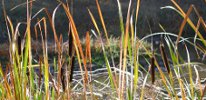
Archived Workshops / References
The Elkhorn Slough CTP website posts and maintains selected workshop materials and articles felt to be the best available science-based information, tools, and techniques that are pertinent to the priority issues identified. Information is grouped according to the four identified priority issues:
Habitat Restoration
The habitat restoration educational programs focus on gathering the latest conservation science and policy on issues regarding species, habitats, and ecological processes identified as critical by regional planning documents and ongoing local needs assessments. Two specific educational foci have been identified at this time.
- Conservation, ecology, restoration, and management of unique coastal habitats
- Recovering endangered species
Central Coast Fire Learning Network
Grasslands Monitoring and Management
Habitat Restoration and Water Quality Management
Landscape-level conservation planning
Ohlone Tiger Beetle: Public Site
Riparian Conservation and Ecology
Santa Cruz Long-Toed Salamander
Watsonville to Elkhorn Wetlands Conservation Alliance
Maintaining Biodiversity
There are many issues in maintaining biological diversity in California, but a primary one identified by local and regional analyses has been controlling non-native species.
- Control of non-native, invasive plants
- Control of non-native wildlife
California Fish and Wildlife Staff Trainings
Polluted Runoff
Agriculture and its concomitant pollutants are widely recognized as an important issue in our region. The combination of local research, political pressure, and an innovative agricultural community make for fertile ground for the development of ESNERR CTP educational programs in this area. Until additional resources are obtained, we will largely focus on developing partnerships to explore the following issues. Sediment and nutrients from agricultural fields adjacent to Elkhorn Slough, nearshore waters, and other regional wetlands. Sediment and nutrients as a non-point source pollution that is associated with intense livestock grazing. Pesticide contamination of Elkhorn Slough, nearshore waters, and other regional wetlands.
Modeling Nitrogen in the Elkhorn Watershed
Moro Cojo Slough Water Quality
Tembladero Slough Water Quality
Sustainable Human Systems
We recognize that, in order to have more resilient and sustainable human systems, the Coastal Training Progam must work to train people for better organizational effectiveness, giving them the tools they need for better planning, meetings, negotiations, etc. This educational area focuses our efforts on asking what it takes to sustain our efforts at improving human-nature interaction. These are often economic or social tools, rather than being more focused on biotic systems.
California King Tide Initiative
Central Coast Fire Learning Network
Central Coast Rangeland Coalition
Central Coast Rangeland Coalition's Rancher, Manager, and Scientist Forum on Rangeland Conservation
Geographic Information Systems (GIS)
